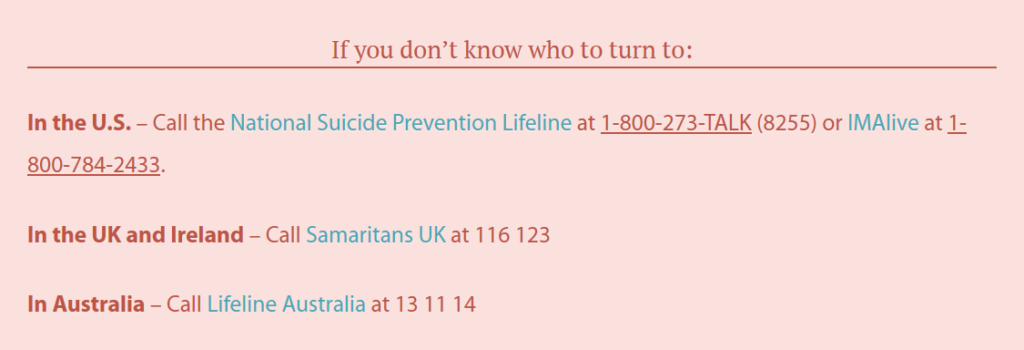If you’re feeling suicidal in recovery, here is some information and a few suggestions to help with feeling more comfortable about seeking help for suicidal thinking.
Recovery from addiction can bring up many issues related to emotional and psychological health. In fact, some people need to heal from the depression that perhaps led them to use substances in the first place. And addiction can make mental illness (depression, anxiety, bipolar disorder, etc.) more severe.
As your body and brain get used to living without drugs or alcohol, you might begin to feel the emotions that you once were aiming to push away through substance use. Wanting to numb out feelings is a very common reason behind why addictions start. And now that you’re sober, those feelings may return. In some cases, recovery can bring depression or anxiety to the surface. And with depression, suicidal thoughts might also appear.
Having suicidal thoughts is highly associated with depression. And in many cases, someone who is thinking about suicide is not thinking about getting help for their suicidal thinking. Even if you’re already involved in some sort of addiction rehab program, many people have a hard time admitting that they’re having suicidal thoughts. Plus, if the thoughts about suicide are frequent, a person’s focus is often about ending the pain or how and when they might commit suicide. However, occasionally, a suicidal person might have a thought about getting help. Amidst the planning and thinking about suicide, there may be a thought about a better and healthier way out of the pain. It’s as though there is a glimmer of light in a tunnel of dark thinking. The thoughts you have about getting help may just be the way out.
If you are someone who is suicidal and you notice yourself having a thought about getting help, it’s something to pay attention to. Typically, someone who is suicidal believes that committing suicide is the only way out of their problems. They believe that this will make everything better, for everyone. However, suicide is a permanent solution to a temporary problem. Although problems may not feel temporary, over the course of one’s life, problems will in fact change.
In fact, if you’re in recovery, you’re likely to find relief from your psychological and emotional pain. If you’re having thoughts about talking to someone about suicidal thoughts, here are a few suggestions to help with feeling more comfortable about seeking help for suicidal thinking:
Write down your thoughts about getting help. Sometimes, just putting our thoughts down on paper can help solidify them. It can help them become more real and make you ‘feel heard.’
Imagine what might come out of reaching out for help. Do you expect it to be embarrassing? Or do you imagine that a mental health professional could provide their assistance in a supportive and non-judgmental way? If you’re in recovery now, is there someone you’re already working with whom you feel comfortable?
Talk to someone, even if it’s a friend, about your suicidal thoughts. If there’s a part of you that wants to get help, perhaps there is one person you feel comfortable with, even if it’s a friend. You don’t have to go straight to a professional. Talking about it with friends can help you at least begin the conversation. If you have a sponsor, reach out to your sponsor. The important thing is to get what is in your head – your thoughts – out whether via writing or expressing it verbally.
When you’re ready, get professional help. You might call your therapist, drug counselor, or a sober coach and/or mental coach that understands as well as can help guide you back into functioning more healthy. Getting help from a professional will strengthen your ability to heal from suicidal thinking.
These are a few suggestions to help you move toward health and healing. If you would like more tips, check out the tips in “Are You Feeling Suicidal?”
Suicidal thinking doesn’t have to take your life. With help and support, you can move past a desire to commit suicide and continue healing the one precious life you have.

If you feel you need help, Connections in Recovery can put a plan of action into place, whether it’s finding you a “right-fit” sober coach or companion, putting a treatment team together (i.e. therapist, psychiatrist, nutritionist, life coach, at-home nurse, a safe transport and more), or provide you with case management to help you get back on your feet. We tailor build an action plan for each one of our clients to ensure all needs are being met so that they can live a healthier, safer, and happier life.




